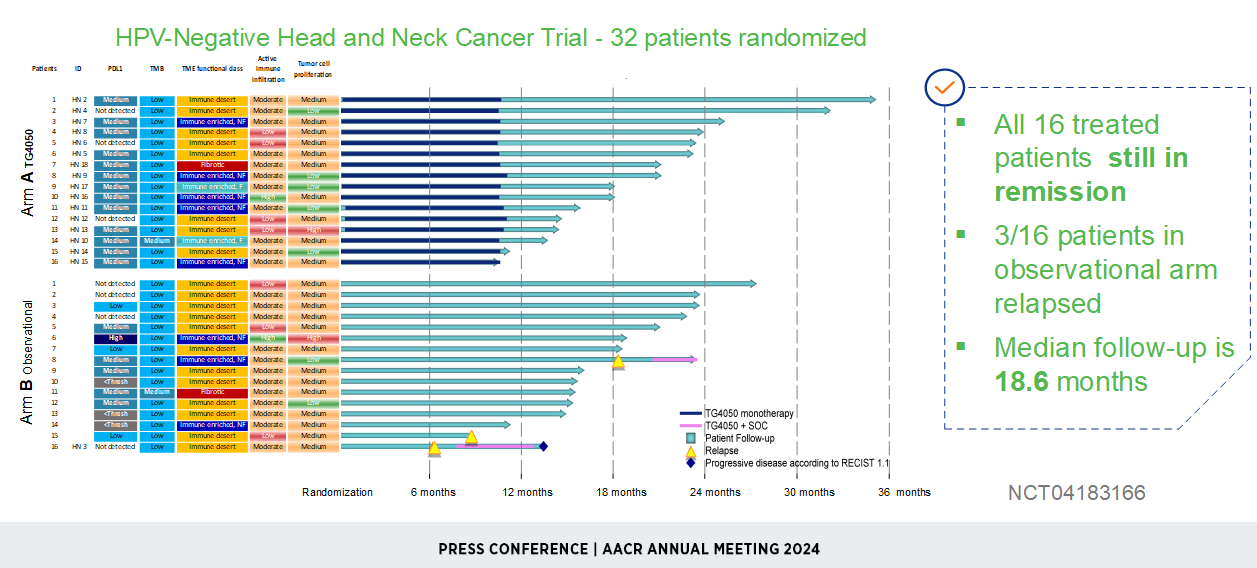
AACR 2024 – Transgene gets a “vaccine” boost
Early data with the group’s personalised project intrigue, but Transgene has a long road ahead.
Early data with the group’s personalised project intrigue, but Transgene has a long road ahead.

Moderna and BioNTech are the big names in personalised neoantigen-based immunotherapies, but the French microcap Transgene is also making a bid here. AACR yesterday saw intriguing but early results on its contender, TG4050, in adjuvant head and neck cancer, a field that has so far seen little competition.
Most of the presented data concerned immune responses to the therapy; however, there were also some clinical data showing no relapses in TG4050-treated patients. Transgene is already planning to push into phase 2, and also has a trial in the works in an as-yet-unnamed cancer. The company is funded until the end of 2025, but as with all small groups it will have to stay focused if it is to succeed.
Transgene’s stock climbed 10% today, but the group is still only worth around €135m.
30 neoantigens
TG4050 is an individualised therapy comprising up to 30 neoantigens from a patient’s tumour, delivered via a modified vaccinia ankara viral vector – which is already used in infectious disease vaccines.
The phase 1 study presented at AACR enrolled HPV-negative head and neck cancer patients who, after surgery and adjuvant chemoradiotherapy, were randomised to either TG4050 or no therapy; it was hoped that therapy could prevent relapse. On recurrence, patients could receive TG4050 plus standard of care, including checkpoint inhibitors.
After a median follow-up of 18.6 months none of the 16 patients in the TG4050 arm had relapsed, compared with three of 16 in the control arm. Transgene noted that in this population, and with current standard of care, around 40% of patients would be expected to relapse within 24 months.

Transgene now has to replicate this result in phase 2. During an AACR press conference, Dr Olivier Lantz of the Institut Curie, who presented the data, said the expansion cohort would enrol at least 23 patients in each arm, and would be powered to detect a clinical benefit.
Transgene claims that TG4050 is the only neoantigen immunotherapy targeting adjuvant head and neck cancer, but Lantz said the project could be expanded into later-stage head and neck cancer, including metastatic disease, likely in combination with checkpoint inhibitors.
In the metastatic setting Moderna presented data at AACR on its Merck & Co-partnered neoantigen contender mRNA-4157, from part C of the phase 1 Keynote-603 solid tumour trial. In 22 unresectable HPV-negative head and neck patients receiving mRNA-4157 plus Keytruda there were six responses, including two complete. However, patients were checkpoint inhibitor-naive at baseline, making it hard to tease out mRNA-4157’s benefit.
And Moderna’s focus with mRNA-4157, for now, is adjuvant melanoma, NSCLC and cutaneous squamous cell carcinoma.
Transgene could have a chance to get ahead of the pack in adjuvant head and neck cancer, but if the neoantigen approach really works here then it could soon have some stiff competition – and the French group will have to be careful not to spread itself too thinly.
1391













